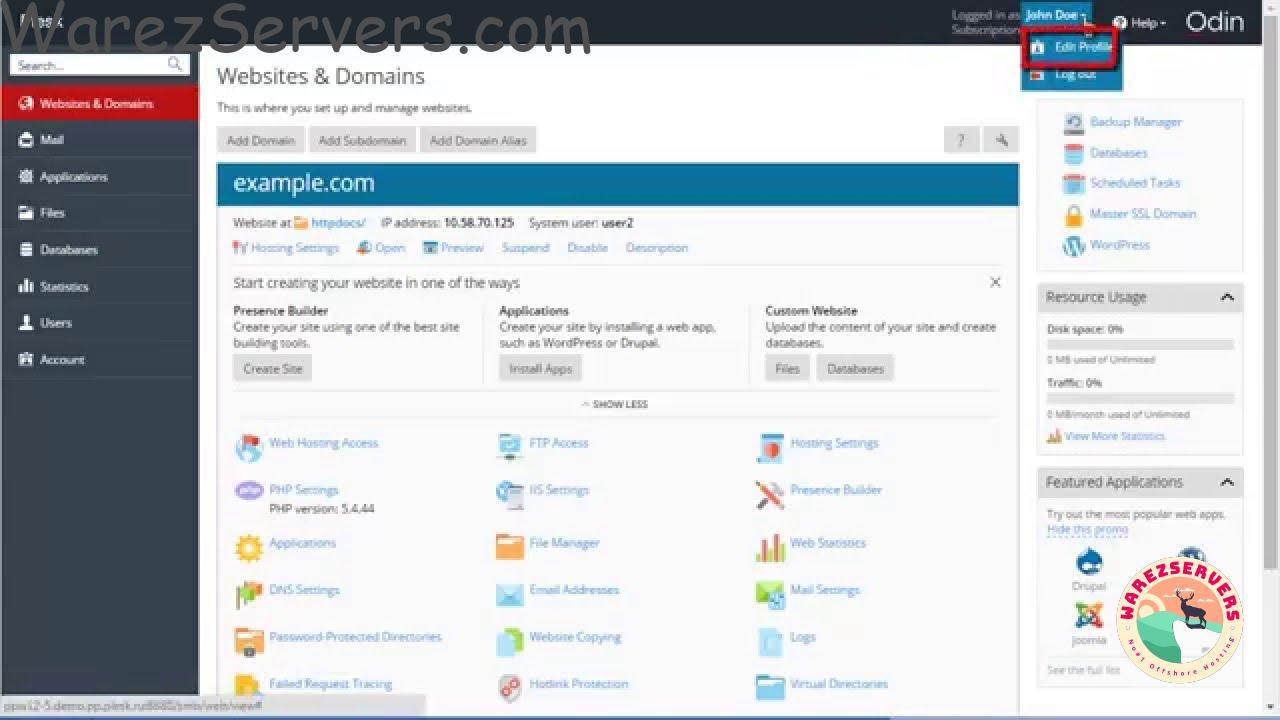Plesk and cPanel are two of the most popular web hosting control panels. The difference between the two is that Plesk is a commercial grade control panel with a lot more features and cPanel/WHM is an open source control panel with less features. This article will explain the difference between the two, including why one should be used over the other.
What is Plesk?
It is a web hosting control panel. It is a web server that does not require any software installation on the server itself. It is a completely Web-based hosting control panel. It is also free to use and has a lot of features that can help you do your job a lot easier. You can also use Plesk to manage your website’s email, DNS, and FTP. The main difference between them, that the latter is installed on the server and is used to manage a server’s software. It also has a lot of features that can help you manage your website and its content.
Who should use Plesk?
It is a web hosting control panel that is used to manage the web hosting services of a particular server. It is mainly used by web hosting service providers and their customers. A hosting service provider can use the control panel to manage the hosting services of their clients. The hosting service provider can also use the control panel to manage their own hosting services.
![Top Feature Analysis: Comparing Plesk and cPanel in 2023 Exploring the Differences Between Plesk and cPanel [Pros and Cons]](https://blogs.warezservers.com/wp-content/uploads/2023/01/maxresSdefault.jpg)
Differences Between Plesk and cPanel
What is cPanel?
It is an open-source web hosting control panel for Linux, Unix, and Windows operating systems. It is primarily used for managing web hosting services. It provides users with a web hosting control panel, website statistics, and website building tools. It also provides a web interface for users to manage their domains and emails. Plesk is a popular web hosting control panel for Linux, Unix, and Windows operating systems. It is used primarily for managing web hosting services. It provides users with a web hosting control panel, website statistics, and website building tools. It also provides a web interface for users to manage their domains and emails. What is the difference between both? Plesk is a popular web hosting control panel for Linux, Unix, and Windows operating systems. It is primarily used for managing web hosting services. It provides users with a web hosting control panel, website statistics, and website building tools. It also provides a web interface for users to manage their domains and emails.
![Top Feature Analysis: Comparing Plesk and cPanel in 2023 Exploring the Differences Between Plesk and cPanel [Pros and Cons]](https://blogs.warezservers.com/wp-content/uploads/2023/01/frame03_1.png)
Differences Between Plesk and cPanel
Who should use cPanel?
It is a powerful web hosting control panel. It is a web hosting software that is made by Interserver. It is a popular web hosting control panel that is used by many of the top web hosting companies in the world. In contrast, It is a web hosting control panel that is made by the company called “cPanel”. It is a less popular web hosting control panel that is used by smaller companies.
Some Features for distinguishing both of them:
Interface design
When it comes to exploring the differences between them, one major factor to consider is the interface design. It has a classic, straightforward interface that is easy to use and intuitive. It also offers a mobile-friendly version, which makes it easy to manage the system through a smartphone or tablet. Plesk, on the other hand, offers a more modern, streamlined interface. It is also more customizable and has more advanced features, which can be overwhelming for some users. Ultimately, the choice of interface design will depend on the user’s level of technical expertise and preferences.
Migration capabilities
When it comes to migration capabilities, Both offer powerful solutions for those who need to move their websites quickly and easily. Plesk allows users to migrate data from one server to another with a single click. It also supports a wide range of common databases including MySQL, PostgreSQL and MS SQL, so you can move your applications in a flash. cPanel, on the other hand, provides a more manual process, which requires users to back up their data, and then manually migrate it over to the new server.
Security features
When it comes to security features, both offer top-of-the-line protection for servers. Plesk provides a firewall and malware scanner to protect against malicious attacks. Additionally, you can set up secure FTP (SFTP) to protect data transfers and enable two-factor authentication for improved login security. This panel also offers a firewall and malware scanner, as well as SSL/TLS encryption for secure data transfers and support for automated backups for extra protection. Both also have built-in security logging systems for detailed monitoring.
Pricing
When it comes to pricing, Both offer very different options. Plesk is a more expensive option, with no free version available and their pricing plans starting at $5/month. On the other hand, cP offers a free version and more affordable pricing plans starting at $3.95/month. The main difference between the two is that this offers more features than Plesk, so depending on how complex your needs are, the cost can be worth it. However, it’s important to research both solutions before making your final decision.
Features for WordPress hosting
When looking at WordPress hosting, there are certain features that are essential to consider. Firstly, you’ll need to ensure that the hosting provider offers the latest version of WordPress. Secondly, look for options like one-click WordPress installation and setup. Third, ensure that your hosting provider offers reliable security and performance features. And lastly, make sure that your hosting provider offers helpful WordPress-specific features such as staging environments, advanced caching, and support for popular WordPress plugins. When comparing both panel you should look at these essential WordPress hosting features to determine which option best meets your needs.
Ease of use
When it comes to ease of use, both are very user friendly and easy to learn. Plesk provides a comprehensive dashboard that is easy to navigate, and provides all the tools you need in one place. cPanel, on the other hand, is a bit more complicated, as it requires users to open a multitude of menus to get to the tools they need. Both hosting control panels have an intuitive setup process and video tutorials to help beginners get started. Ultimately, the choice between the two comes down to personal preferences.
Backup options
Backups are an important part of any hosting solution. Both have comprehensive backup options, but they differ significantly in their implementation. Plesk offers a full-server backup that includes all files, databases, and settings. This can be done manually or scheduled, and backups can be stored on-site or sent to an off-site location. cPanel, on the other hand, offers more granular backups, allowing you to choose specific databases, files, or directories to back up. Both platforms also offer an easy way to restore backups when needed.
Order cP/WHM or Plesk: https://www.licensegallery.com/
Both excellent options for web hosting. Plesk is a reliable platform that makes hosting and managing websites easier, while cPanel is a popular choice for its many features and intuitive user interface. There is no one-size-fits-all solution and both have their advantages and disadvantages. It’s important to consider your specific needs and preferences before deciding which option is best for you.




